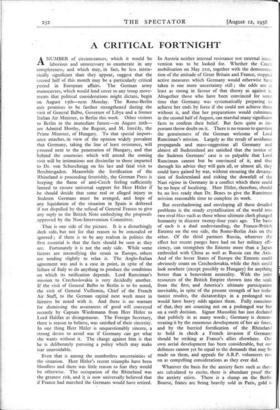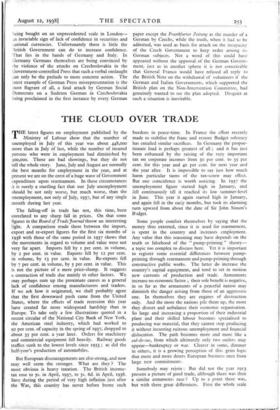A CRITICAL FORTNIGHT
ANUMBER of circumstances, which it would ' be laborious and unnecessary to enumerate in any completeness, and which may, in fact, be less intrin- sically significant than they appear, suggest that the second half of this month' may be a particularly critical period in European affairs. The German army manoeuvres, which would lend cover to any troop move- ments that political considerations might dictate, begin on August t5th—next Monday. The Rome-Berlin axis promises to be further strengthened during the visit of General Balbo, Governor of Libya and a former Italian Air Minister, to Berlin this -week. Other visitors to Berlin in the immediate future—on August 2oth- are Admiral Horthy, the Regent, and M. Imredy, the Prime Minister, of Hungary. To that special import- ance attaches, in view of the opinion widely prevalent that Germany, taking the line of least resistance, will proceed next to the penetration of Hungary, and that behind the courtesies which will attend the coming visit will be intimations not dissimilar to those imparted to Dr. von Schuschnigg on his last and fatal visit to Berchtesgaden. Meanwhile- the fortification of the Rhineland is proceeding feverishly, the German Press is keeping the flame of anti-Czech feeling sufficiently fanned to ensure universal support for Herr Hitler if he should decide that some real or alleged injury to Sudeten Germans must be avenged, and hope of any liquidation of the situation in Spain is deferred if not dispelled by the refusal of General Franco to give any reply to the British Note embodying the proposals approved by the Non-Intervention Committee.
That is one side of the picture. It is a disturbingly dark side, but not for that reason to be concealed or .ignored ; if . there is to be any realism in politics the first essential is that the facts should be seen as they are. Fortunately it is not the only side. While some factors are intensifying the strain in Europe, others are tending slightly to relax it. The Anglo-Italian agreement was and is a. case in point, in spite of the failure of Italy to do anything to produce the conditions on which its ratification depends. Lord Runciman's mission to Czechoslovakia is very decidedly another. If the visit of General Balbo to Berlin is to be noted, the visit of General Vuillemin, Chief of the French Air Staff, to the German capital next week must in fairness be noted with it. And there is no warrant for dismissing the assurances of good will conveyed recently by Captain Wiedemann from Herr Hitler to Lord Halifax as disingenuous. The Foreign Secretary, there is reason to believe, was satisfied of their sincerity. In one thing Herr Hitler is unquestionably sincere, a strong desire to avoid war if Germany can get what she wants without it. The charge against him is that he is deliberately pursuing a policy which may make war unavoidable.
Even that is among the numberless uncertainties of the situation. Herr Hitler's recent triumphs have been bloodless and there was little reason to fear they would be otherwise. The occupation of the Rhineland was the greatest risk, and it is now universally believed that if France had marched the Germans would have retired. In Austria neither internal resistance nor external inter- vention was to be looked for. Whether the Czech mobilisation on May 2t st, together with the demonstra- tion of the attitude of Great Britain and France; stopped active measures which Germany would otherwise have taken is one more uncertainty still ; the odds are at least as strong in favour of that theory as against it. Altogether those who have been convinced for some time that Germany was systematically preparing to achieve her ends by force if she could not achieve them without it, and that her preparations would culminate in the second half of August, can marshal many significant facts to confirm their belief. But facts quite as im- portant throw doubt on it. There is no reason to question the genuineness of the German welcome of Lord Runciman's mission. Largely as the result of assiduous propaganda and mass-suggestion all Germany and almost all Sudetenland are satisfied that the justice of the Sudeten Germans' case is so palpable that Lord Runciman cannot but be convinced of it, and that through his advice they will gain all, or almost all, they could have gained by war, without ensuring the devasta- tion of Sudetenland and risking the downfall of the Nazi regime in Germany in a conflict which there could be no hope of localising. Herr Hitler, therefore, should be no less ready than Dr. Benes to give the Runciman mission reasonable time to complete its work. .
But overshadowing and enveloping all these detailed problems is the steady crystallisation of Abe. world :into two rival blocs such as those-whose ultimate clash plunged humanity in disaster -twenty-four years ago. The basis of . each is a dual understanding, the Franco-British Entente on the one side, the Rome-Berlin Axis on the other. Of the third partners Russia, whatever the effect her recent purges have had on her military effi- ciency, can strengthen the Entente more than a Japan embroiled with China as well as Russia can the . Axis. And of the lesser States of Europe the Entente could obviously count on Czechoslovakia, while the Axis could look nowhere (except possibly to Hungary) for anything better than a benevolent neutrality. With the joint resources of the British Empire thrown into the scale from the first, and America's ultimate participation inevitable, in spite of the present strength of her isola- tionist resolve, the dictatorships, in a prolonged war would have heavy odds against them. Fully conscious of that, they are counting not on a prolonged war but on a swift decision. Signor Mussolini has just declared that publicly in as many words ; Germany is demon- strating it by the enormous development of her air force, and by the hurried fortification. of the Rhineland to hold in check a French invasion if Germany should be striking at France's . allies elsewhere. Our own aerial development has been considerable, but our defences cannot yet be equal to the demands that may be made on them, and appeals for A.R.P. volunteers rest on as compelling considerations -as they ever did.
' Whatever the basis for the anxiety facts such as these are calculated to excite., there is abundant proof thr the anxiety exists. There is a slump on the Berlin Bourse; francs are being 'heavily sold in Paris;_ gold. is , . being bought on an unprecedented scale in London— an invariable sign of lack of confidence in securities and national currencies. Unfortunately there is little the British Government can do to increase confidence. That lies in the hands of Germany and Italy. In Germany Germans themselves are being convinced by the violence of the attacks on Czechoslovakia in the Government-controlled Press that such a verbal onslaught can only be the prelude to more concrete action. The latest example of German Press misrepresentation is the most flagrant of all, a fatal attack by German Social Democrats on a Sudeten German in Czechoslovakia being proclaimed in the first instance by every German paper except the Frankfurter Zeitung as the murder of a German by Czechs, while the truth, when it had to be adinitted, was used as basis for attack on the incapacity of the Czech Government to keep order among its German subjects. Not a word of this could have appeared without the approval of the German Govern- ment, just as in another sphere it is not conceivable that General Franco would have refused all reply to the British Note on the withdrawal of volunteers if the German and Italian Governments, which supported the British plan on the Non-Intervention Committee, had genuinely wanted to see the plan adopted. Disquiet at such a situation is inevitable.







































 Previous page
Previous page